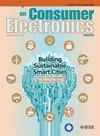ILPA:元宇宙和数字孪生环境中的智能位置偏好分配框架
IF 4.3
2区 计算机科学
Q1 ENGINEERING, ELECTRICAL & ELECTRONIC
引用次数: 0
摘要
随着虚拟世界和数字孪生的快速发展,消费电子产品,如智能手机和可穿戴设备,是融合物理和数字领域的关键。这种整合使得移动群体感知(MCS)成为一种重要的数据收集方法。在MCS中,工作人员感知任务的效率直接决定了数据收集的及时性,从而影响数字孪生服务的能力和服务消费者的利益。然而,提高效率往往需要工人加速数据收集,这可能会牺牲精确处理,影响整体数据质量。相反,为了保证高质量的数据,员工可能需要花费更多的时间来细致地执行任务,这可能会降低效率。因此,同时实现数据采集的高效率和高质量是一个典型的多目标优化问题,其中效率目标和质量目标经常发生冲突。在此背景下,提出了一种智能位置偏好分配(ILPA)框架,以增强众感的鲁棒性,同时最大限度地提高数据收集的效率和质量。首先,提出了一种优化质量和效率的位置偏好优化算法(LPOA),得到了工人的位置偏好。然后,在多地点任务下,构造了一个位置偏好分配方案(LPAS)来有效地实现最优分配。利用两个真实数据集进行的综合实验验证了数字孪生模型中ILPA框架的有效性和适用性。本文章由计算机程序翻译,如有差异,请以英文原文为准。
ILPA: An Intelligent Location Preference Assignment Framework for MCS in Metaverse and Digital Twins Environments
With the rapid development of metaverse and digital twins, consumer electronics, like smartphones and wearable devices, are pivotal in merging the physical and digital realms. This integration has led to the prominence of Mobile CrowdSensing (MCS) as a critical data collection method. In MCS, the efficiency with which workers sense tasks directly determines the timeliness of data collection, which affects the capabilities of digital twin services and service consumers’ interests. However, improving efficiency often requires workers to accelerate data collection, which may sacrifice precise processing, affecting overall data quality. Conversely, to ensure high-quality data, workers may need to spend more time on meticulous task execution, which can reduce efficiency. Therefore, simultaneously achieving high efficiency and high quality in data collection presents a typical multi-objective optimization problem, where efficiency and quality goals often conflict. Against this background, an Intelligent Location Preference Assignment (ILPA) framework is proposed to strengthen the robustness of crowdsensing while maximizing the efficiency and quality of data collection. Firstly, a Location Preference Optimization Algorithm (LPOA) is developed to optimize quality and efficiency, obtaining workers’ location preferences. Then, under multi-location tasking, a Location Preference Assignment Scheme (LPAS) is constructed to achieve optimal assignment effectively. Comprehensive experiments conducted with two real-world datasets validate the effectiveness and applicability of the ILPA framework within the digital twins model.
求助全文
通过发布文献求助,成功后即可免费获取论文全文。
去求助
来源期刊
CiteScore
7.70
自引率
9.30%
发文量
59
审稿时长
3.3 months
期刊介绍:
The main focus for the IEEE Transactions on Consumer Electronics is the engineering and research aspects of the theory, design, construction, manufacture or end use of mass market electronics, systems, software and services for consumers.

 求助内容:
求助内容: 应助结果提醒方式:
应助结果提醒方式:


